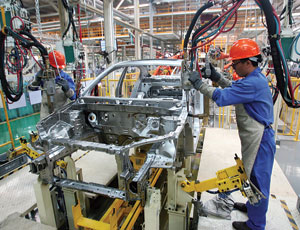Following historic drops in the manufacturing sector brought on by the global recession, firms are looking for signs that the worst is over. Around the globe, capacity utilization in manufacturing plummeted, with the U.S. hitting 65.1% in June—the lowest since the Federal Reserve began tracking it in 1967. Since June, the rate has crept up slightly—reaching 67.6% in October—but remains well below the historic average of 79.6%.

Michael Conley, vice president of the Construction Users Roundtable and engineering manager with DuPont, Wilmington, Del., says owners in the manufacturing sector are cautiously optimistic the market has bottomed out. “Generally, businesses are tentative about making major commitments going forward,” he says. “It will be tough for contractors because things will remain slow and the scope of projects will be smaller. Hopefully things can pick up, but it won’t be a V-shaped recovery.”
But owners are taking a much rosier view of rapidly emerging markets such as China, India, Russia and Brazil. Garry Warren, vice president of world engineering at Johnson and Johnson, New Brunswick, N.J., and also a CURT member, says all companies with global reach are eyeing both the opportunities and challenges of these markets.
“Those parts of the world aren’t stopping; they keep growing,” he says. “In the long term, businesses will need to have access to those markets to be competitive global companies. From a construction standpoint, it raises the challenge of being able to put up facilities at a reasonable cost.”
As auto sales slump in the Western world, China surpassed the U.S. in 2009 as the largest auto market in the world, and companies are looking to invest. Hyundai announced in November that it would build an $800-million factory in China. That will be the company’s third there. Construction could begin in early 2010.
Nissan also announced plans to invest $750 million in its facilities in China, including construction of a plant to build electric vehicles. Toyota is expected to restart a stalled $585-million plant in Changchun, according to Japan’s Nikkei news service. The project had been expected to break ground in spring 2009, but construction plans were shelved because of the global financial crisis.
Chinese car manufacturers also are expanding. Tokyo-based contractor Taikisha Ltd. will start work on two paint shops for domestic manufacturers this spring, a $36-million facility for Shenyang Brilliance Jinbei Automotive and a $39-million shop for Tianjin FAW XIALI Automobile Co.
Cheng Shin Rubber Industry Co. in November announced it would build a new $370-million tire manufacturing plant in Taiwan. Groundbreaking is scheduled for June.
Elsewhere, Suzuki broke ground in November on a $225-million auto plant in Thailand to build compact cars for the Southeast Asian market. The project is expected to be completed in early 2012.
The industrial-process sector also has taken a big hit. The once-hot pharmaceutical market has cooled considerably, leaving companies that once banked on big projects wondering when the opportunities will return. “I see no signs of hope [for pharmaceuticals],” says Johan Karlström, president and CEO of Stockholm-based Skanska. “We see nothing in that market right now.”
However, some big pharmaceutical companies are moving ahead with growth plans. Following the announcement from the Chinese government that it intends to spend $124 billion over the next three years to improve the nation’s health-care system, pharmaceutical companies have started to hatch new strategies for China.
Novartis has announced it would invest $1 billion over the next five years in its pharmaceutical research and development facilities in China, including an expansion of its facility in Shanghai and $250 million for a new facility in Changshu.
Pfizer also announced plans to expand its Shanghai operations and build a new research and development facility in Wuhan, China.

Post a comment to this article
Report Abusive Comment